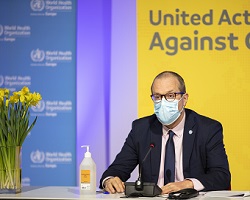Statement – Catastrophic impact of COVID-19 on cancer care

WHO
Statement by Dr Hans Henri P. Kluge, WHO Regional Director for Europe
4 February 2021, Copenhagen, Denmark
COVID-19 poses multiple threats. One we cannot afford to ignore is an epidemic of cancer. Ensuring continuity of cancer care while fighting COVID-19 has been hugely challenging for countries across the WHO European Region, a continent that accounts for approximately one third of all reported COVID-19 cases and deaths to date – that is more than 750 000 lost lives.
In a normal year, cancer kills close to 2.2 million people in the Region: a far-too-heavy toll when we know that these deaths could have been prevented.
Compromised cancer services
Early on in the pandemic, WHO found that globally, in 122 out of 163 countries, noncommunicable disease services had been disrupted, and that 1 in 3 countries in the European Region had partially or completely disrupted cancer services.
At the Kyrgyzstan National Center of Oncology, the number of cancers diagnosed in April last year dropped by 90%, while in the Netherlands and Belgium in the first lockdown of 2020, it dropped by 30–40%. Delayed diagnosis and treatment in the United Kingdom are expected to result in an increase in the number of deaths from colorectal cancer by 15%, and 9% for breast cancer over the next 5 years.
A crisis of noncommunicable diseases, including cancer, is brewing, brought on by the pandemic.
Cancer in a pre-COVID-19 era
Let me set the scene. Even in a normal year, noncommunicable diseases such as cancer, chronic respiratory diseases and diabetes are the leading cause of death and disability in the WHO European Region, accounting for more than 80% of deaths.
Funds for palliative care and cancer prevention and control are insufficient, and too often, the majority of national health resources are put towards treatment at the cost of investing in prevention and early detection.
Across and within countries in the Region, differences in cancer outcomes are pronounced, and the fact that inequalities in care have increased in the past year calls for more solidarity and far stronger commitment.
The numbers speak for themselves. In 2020, 4.8 million Europeans were diagnosed with cancer. That’s more than 13 000 people every day, 546 every hour, 9 every minute. All of us know someone who has experienced cancer. One in 3 of us in western European countries and 1 in 4 of us in eastern European countries will develop cancer in our lifetimes.
A deadly interplay
The impact of COVID-19 on cancer in Europe is complex, and has been referred to by some as a “deadly interplay”. Due to travel restrictions and the enormous strain on health systems of fighting COVID-19, cancer services have been disrupted across the entire WHO European Region, significantly delaying diagnosis and treatment, directly impacting the chances of a cure or survival for hundreds of thousands of cancer patients.
Some countries have experienced shortages of cancer drugs, and many have seen a significant drop in new cancer diagnoses – even the most resource-rich countries. Oncology health personnel were in demand even before the pandemic. The high cost of cancer medicines and treatments is a challenge for all countries, including high-income ones.
Pre-existing inequalities are also growing because of the economic crisis, making it harder for many to adopt healthy behaviours or have access to prevention or care services.
The impact of the pandemic on cancer in the Region is nothing short of catastrophic. It has made us realize the actual human cost of neglecting a noncommunicable disease such as cancer.
This is our wake-up call, from grassroots to governments, to tackle cancer together.
Fast-track solutions
Today we are launching a Pan-European Cancer Initiative to unite all towards better cancer control and prevention and to enable policy-makers to make the right decisions to address cancer effectively.
It is a critical strand of the WHO European Programme of Work, which seeks to promote effective solutions to the health issues our citizens face through united action for better health.
The Initiative encompasses 5 elements: prevention (ultimately a political choice), early detection, access for all to diagnosis and treatment, palliative care, and a focus on data.
We need change along the cancer continuum. Our vision is bold, but realistic. We strive to create a Region where cancer is no longer a life-threatening disease, where dying from cancer is no longer accepted or the norm.
Our initial focus is on childhood, cervical and breast cancers. We seek to strengthen collaboration and partnerships, reinforce political leadership, engage youth and civil society and – last but not least – fast-track the implementation of WHO’s signature solutions. These are cost-effective, evidence-based policies and measures accompanied by technical guidance and tools, aligned with WHO expertise and resources to achieve real impact at country level.
Today, I welcome Aron Anderson, a Swedish adventurer with first-hand experience of cancer, as a Cancer Ambassador for WHO/Europe. Aron’s voice and personal experience will be invaluable in the work ahead, uniting forces against cancer.
Today, we have an opportunity to map a new path, to put the lessons of the pandemic to good use, and to step up cancer control and prevention. We can’t eliminate cancer – but we can aim to eliminate cancer deaths. Join us in United Action Against Cancer.
Thank you.



